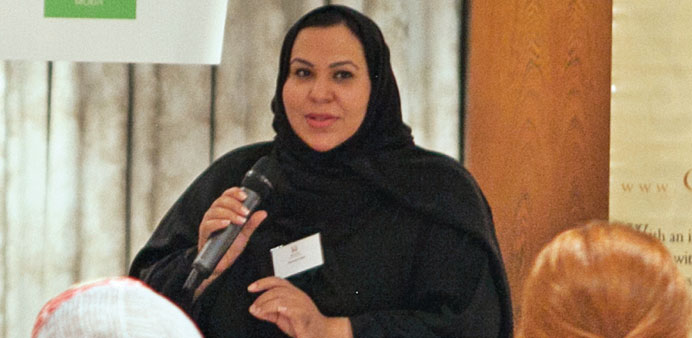By Denise Marray/Gulf Times Correspondent /London
Shareefa Fadhel, Managing Director and Co-founder of the Roudha Center for Entrepreneurship & Innovation believes the achievements of Arab businesswomen across the region need to be highlighted internationally to create a better understanding of their role. “We have a lot of businesswomen in Qatar and in the Middle East region who we need to promote internationally and allow their achievements to shine,” she observed.
Fadhel was speaking at the Women’s Growth and Success Forum in London organised by founder Zainab Al-Farhan Al-Iman, owner and general manager A&Z Traders. The event, which Al-Imam said was intended to “empower businesswomen”, attracted leading businesswomen, executives, ambassadors and royals from across the Middle East and North Africa (Mena) region.
Fadhel told the audience that she drew inspiration from her grandmother. “My grandmother was a Bahraini living in the 1930s to 1990s and to me she was the best businesswoman I have ever seen. My grandfather was a pearl diver so he was at sea most of the time, so she ran the household,” she said.
She paid tribute to her grandmother, who herself had no education, for making sure that her children were all educated. She recalled how this capable, strong woman was at the heart of the family and oversaw financial matters. “She had a steel chest under her bed that contained the money of almost everyone in the family – she was in fact a small bank,” she said.
If a family member wanted a loan, the grandmother would set the terms and deadline for repayment. “She wasn’t educated but she was the best mathematician I have seen,” she added.
She pointed out that women like her grandmother have always played a key role in families across the region and it was a history of Muslim women that should be celebrated and given wider recognition. Fadhel said that her mother, a teacher who also designed traditional wedding dresses, had inspired her to keep her cultural traditions.
The Roudha Center, she explained, developed in response to a question posed by Sheikha Mozah about how the number of women in business could be increased.
Research showed that 26% of Qatari women were educated to post-graduate level and had disposable incomes and an interest in opening a business. What was lacking was a place where they could get advice and direction. The Roudha Center has played an important part in answering those needs with over 8,000 women benefitting from its services since it started operating in 2011.
Fadhel advised aspiring businesswomen to be ‘passionate’, ‘persistent’ and ‘patient’. She said it was important not to lose hope if people didn’t immediately respond positively to an idea. She added that it is very important for women to support women. On a personal level she said: “My dream is to work with underprivileged women – that is the only way we will make a difference in the world.”
Munira Mirza, Deputy Mayor for Education and Culture, said London wanted to issue a welcome to investors from around the world.
She highlighted the advantages that the capital offers in terms of its skills, assets and location and seeks to make it the first choice for people who can take their pick of London, Paris or New York.
Dr Thamer Mahmoud Zaidan, Director Economic Relations Department, League of Arab States, noted: “Arab ladies are optimistic – they want to work and many are doing very well in business.”
He said it is important to empower women and provide access to good education and healthcare to facilitate participation in economic development.
Zineb El Adaoui is an inspiration to all women who aspire to leadership roles. She was appointed by His Majesty King Mohammed VI to the position of Wali of Gharb-Chrarda-Beni Hssen region in Morocco – the first ever Arab woman to hold such a title. She was also the first woman to hold the office of judge in the Court of Auditors going to serve as the President of the regional Court of Auditors in Rabat.
Adaoui, who is the daughter of a theologian, said that in her Muslim family women were always seen as equal to men. She said that women should participate in interpreting Islam and that “the management of Islam should not only be by men because men have interpreted Islam according to what they want.”
She said that that it saddened her to see that women in Saudi Arabia are not permitted to drive, a prohibition which she commented, “is not normal”.
She urged women to be “confident in their competence” and to work intelligently and efficiently in achieving their goals. She dismissed the idea that women had to work twice as hard as men to achieve the same ends.
She also called for women to be supportive of other women and for high achievers to consider the less advantaged in the rural areas.
Feryal Abdulla Ahmed Nass, Board Member, Bahrain Businesswomen’s Society, said the networking through forums and conferences is very important. She added that for women to succeed it is imperative to have the support of family members and employers, as ‘women cannot do it alone’. To women she said: “Don’t forget to give back – support the next generation.”

Fadhel: Vital role for women in business.
